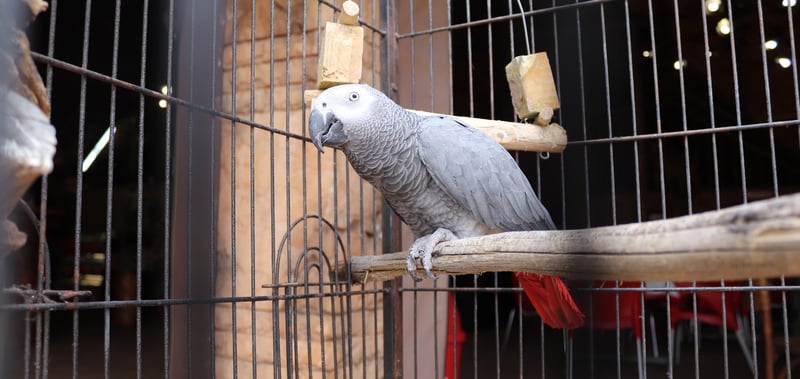
Each year, World Parrot Day is commemorated on May 31 to raise awareness about the urgent threats facing parrots around the globe. While colourful birds like macaws and cockatoos often steal the spotlight, Africa's native parrots, especially the African grey parrot, are being pushed to the brink by a crisis few are talking about.
These birds are not just beautiful creatures with an ability to mimic human speech. They are intelligent, emotional, and social beings. And tragically, many are being silenced forever by greed, exploitation, and neglect.
Why Africa's Parrots Matter
Africa is home to some of the world's most charismatic and intelligent parrot species, including the endangered African grey parrot (Psittacus erithacus) and the lesser-known brown-headed parrot (Poicephalus cryptoxanthus). These birds play a crucial role in their ecosystems by dispersing seeds, maintaining forest health, and contributing to biodiversity.
But their existence is under severe threat. Parrots are being poached, bred in captivity under harsh conditions, and trafficked through both legal and illegal markets. Their suffering is hidden behind the scenes of exotic pet shops and unregulated breeding facilities.
The Dark Side of the Exotic Pet Trade
- Captured for Profit
African grey parrots are among the most traded birds globally. They are stolen from the wild, often stuffed into cramped cages, and shipped across borders. The journey is filled with stress and cruelty. Many do not survive.
Even when the trade is legal, it doesn’t mean it’s humane. Wild-caught parrots suffer immensely. They are ripped from their families and natural environments, unable to fly freely or form the strong social bonds they need to thrive.
- The Myth of Sustainable Trade
Some claim that captive breeding helps protect wild populations, but the reality is far more complex. Captive breeding often serves as a smokescreen for illegal activity, with wild parrots laundered through registered breeding facilities. This fuels demand and creates a loophole for traffickers.
- The Cost of Captivity
Parrots in captivity suffer from loneliness, depression, and boredom. These are highly intelligent animals who need constant stimulation and companionship. In unsuitable conditions, they often begin to pluck their own feathers, refuse to eat, or become aggressive.
Africa's Role and Responsibility
- Home and Export Hub
Africa, particularly countries like Democratic Republic of Congo, Cameroon, and Uganda, has historically been a major exporter of parrots. Although some countries have banned the export of wild parrots, enforcement remains weak.
Kenya and Uganda are at a turning point. Research shows that parrots are still legally and illegally traded, despite mounting evidence of their suffering. African governments must do more to close loopholes and protect these species.
- Parrots as Victims of Wildlife Farming
Just like lions and reptiles, parrots are now being bred in captivity for profit. These wildlife farms often operate with minimal oversight. Conditions are poor, and the animals endure lives of confinement and neglect.
World Animal Protection has in the past revealed how commercial breeding fuels poaching, undermining conservation efforts and further destabilizing wild populations.
A Crisis of Awareness
The biggest tragedy is that most people have no idea this is happening. Unlike big cats or elephants, parrots suffer in silence. They are not seen as victims of cruelty, but as cute pets or collectable trophies.
Public awareness is the first step toward meaningful change. We must shift perceptions and remind the world that wild animals are not pets. They belong in the wild, not in cages.
What Needs to Happen Next
- Ban Commercial Breeding of Parrots
Parrots should not be farmed like livestock. Governments must introduce and enforce bans on the commercial breeding of parrots for trade.
- Remove Parrots from Commercial Species Lists
African grey parrots should be excluded from species lists that allow breeding for profit. Instead, their breeding should be restricted to rewilding and rehabilitation programs.
- Strengthen Policy and Enforcement
National governments must update wildlife laws, invest in enforcement, and close the loopholes that traffickers exploit.
- Partner with Local Communities
Communities play a vital role in parrot conservation. Education, sustainable alternatives, and community-led monitoring can create long-term solutions.
- Elevate Parrots in Conservation Dialogue
Parrots must be given a place in African conservation conversations. They are more than beautiful birds; they are ecosystem engineers and emotional beings.
Conclusion
World Parrot Day is not just a celebration of a bird's beauty or talent for mimicry. It is a call to action. A call to end the silent suffering of parrots in Africa and around the world.
Africa’s parrots are more than victims. They are messengers of the forest, voices of the wild. But if we don't act now, those voices will be silenced forever.
Let us raise awareness. Let us protect their homes. And most importantly, let us stop treating them like products and start respecting them as sentient beings.
Join us in fighting for a wildlife-friendly future.
FAQs
- Why are African grey parrots endangered?
Due to habitat loss, illegal poaching, and the exotic pet trade, African grey parrots have seen drastic population declines and are now classified as endangered. - Can parrots be released into the wild after being pets?
Not easily. Captive parrots often lose survival skills. Rewilding must be done by trained professionals in controlled environments. - Are there laws against trading wild parrots?
Yes, but enforcement is inconsistent. Some countries still allow legal trade that masks illegal activity. - What makes parrots different from other birds?
Parrots are among the most intelligent and social birds. They require mental stimulation, strong social bonds, and space to fly.
5. How can I help?
Do not buy parrots as pets, support organizations fighting illegal wildlife trade, and share awareness to help protect these incredible animals.